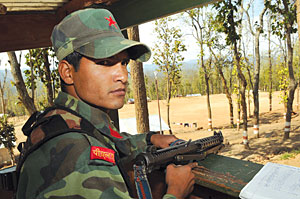 CHONG ZI LIANG |
Maoists are better at manipulating the media than anybody else in Nepali politics. They managed to sell their violent campaign as an uprising of the oppressed even though no Dalit, Madhesi or women ever had any say in the decisions of the politburo. Like the other parties, their political leadership was dominated by Bahun men who issued directives from safe houses in India.
Throughout the decade-long armed conflict, mainly Janajati, Tharu and Dalit youths recruited into the national army and the rebel force killed each other. The Rhododendron Revolution three years ago this week sent resourceful apparatchiks and smart commissars to Constituent Assembly and Singh Darbar, but those who actually fought in the battlefields are interred in 28 UN-monitored camps.
When combatants were celebrating their 8th anniversary at Hattikhor in February, party propagandists ferried busloads of journalists to ensure friendly coverage. The strategy worked: media accounts were full of praise for Pushpa Kamal Dahal's directives to his storm troopers that they should henceforth follow the orders of the Army Integration Special Committee (AISC), headed by himself. But sitting in the press row, there was a foreign journalist who saw (and sensed) that behind their disciplined demeanour, combatants hid anger and resentment.
Two months later, the journalist says she understands why former guerrillas are so angry: there is little difference between previous visits of the king and that of the prime minister. The same gush of dusty wind from the same ex-royal helicopter, similar garlanding, the same tolerance of sycophancy. But more than anything else, it is the prominence of privileged children of the new leaders that angers the disadvantaged most. There on stage while the prime minister was taking the salute was his grandson. Well-dressed pampered kids with Kurmure packs pranced about like little royals.
Dahal probably saw what the contradiction could lead to if the process of resettlement, rehabilitation or integration of Maoist combatants is not accomplished soon. In the history of post-insurgency upheavals, ousters of revolutionary leaders are as common as coup d'?tats. Dahal bad-mouths everyone to hide his own anxiety. His neurotic outbursts are meant for his own cadres. Deep inside, this man is insecure.
Unlike Defence Minister Ram Bahadur Thapa, Dahal probably wants to soft-peddle the issue of civilian control over the army for the moment. With the king gone, an elected government in power and the parliament holding the purse strings, there is no way the army commanders of the future can afford to antagonise political leadership. But on the question of 'integration' of at least some former combatants into the defence forces, Dahal needs a face-saving formula even more urgently than Thapa.
Earlier this week, the government finalised procedures for the establishment of an industrial security force. Some combatants could easily be absorbed into the new corps. But trained in the hit-and-run tactics of a dirty war, former guerrillas are unlikely to make effective sentries. Hard to reform guerrillas taught to attack and ransack.
The best course is still the most obvious one: the government should concentrate on rehabilitating former guerrillas. The resources required to motivate and de-indoctrinate former combatants is not easy to find. Is that why Dahal made that seemingly- pointless visit to Norway and Finland? He returned with just vague reassurances: the Nordics want priority rights over some hydroelectricity and forestry projects which Dahal can't guarantee without getting clearances from hawk-eyed neighbours.
Psychologists believe that hostility results from wilful refusal to accept reality. For the peace process to move ahead, Dahal has to realise that he needs other political parties as much as they need him. His real challenge is not the army's generals, it is the impatient commanders in the camps. Dahal has to have the entire political class behind him to defuse a future mutiny.



